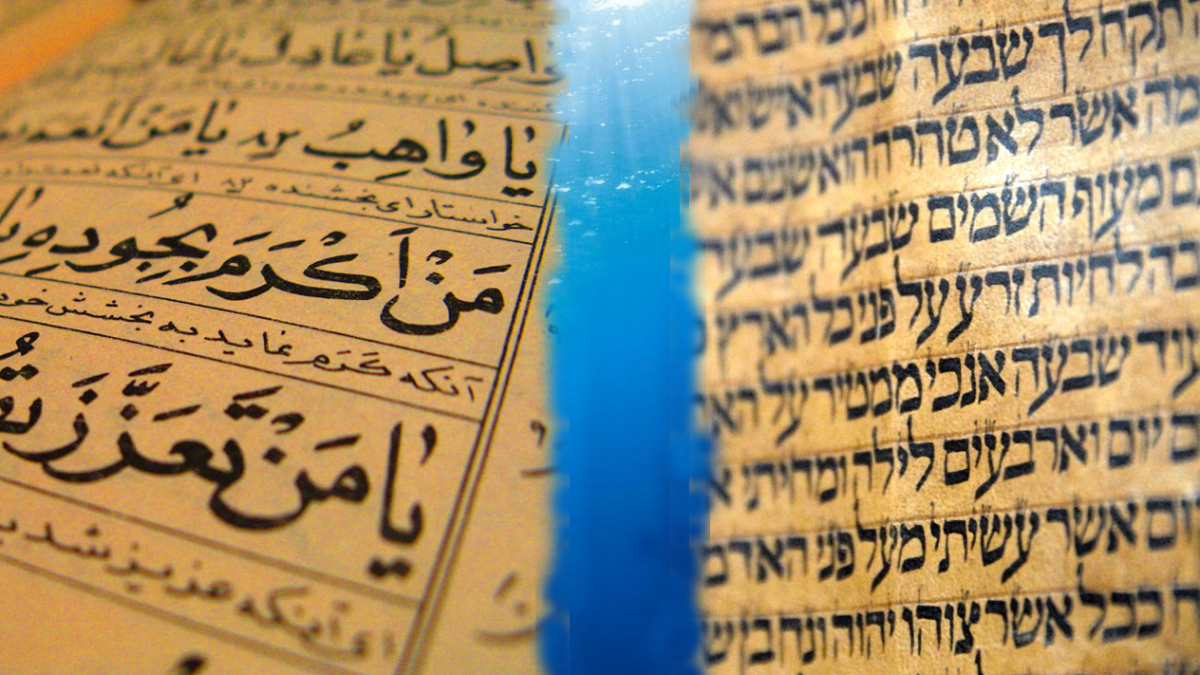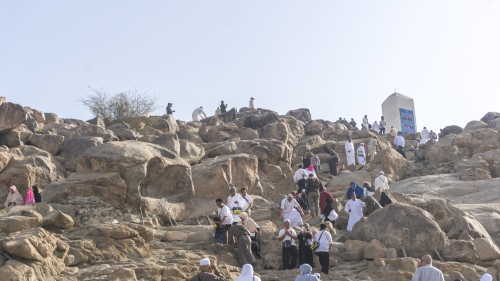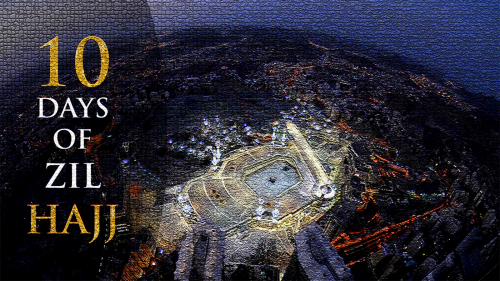Is Prophet Muhammad’s Islam Hidden in the Hebrew Bible?

The Gospels frequently claim that Jesus was the Divine Messiah predicted by the Prophets of Israel; especially Prophet Isaiah, Prophet Jeremiah and Prophet Ezekiel. Jews (and Muslims) reject this claim, and the claim of anyone else who claims to be a Divine messenger, instead of a messenger of the one and only God.
Jews (and Muslims) believe that while the Hebrew Prophets did predict God would anoint a descendant of Prophet David to be a spiritual and political liberator, this Messiah must be a human being. If Jesus was a legitimate Prophet, he would never have said that he was the Son of God.
As the Qur’an states: “Allah will say: Jesus the son of Mary! Did you say to people, worship me and my mother as gods in derogation of Allah'?" He will say: "Glory to You, never would I say what I had no right (to say). Had I said such a thing, you would indeed have known it. You know what is in my heart …" (5:116)
Thus both Islam and Judaism believe that Jesus never claimed to be the Son of God, although some of his disciples said that about him; especially after he was gone and could not rebuke them.
As the Qur’an states: “O People of the Book (Christians) commit no excesses in your religion: nor say of Allah anything but the truth. Christ Jesus the son of Mary was (only) a messenger of Allah, and His Word, which He bestowed on Mary, a spirit proceeding from Him. So, believe in Allah and His messengers. Say not ‘Trinity’: desist: it will be better for you: for Allah is one Allah: Glory be to Him above having a son.” (4:171)
So, what kept most Jews in Medina from seeing that Prophet Muhammad could be a non-Jewish prophet, who like King Cyrus of Persia, was proclaimed a Messianic figure by Prophet Isaiah (45:1)?
First, and most important, all Jews believe that the long period of Jewish prophecy that began with Prophet Abraham, ended about 1.500 years later, with Prophets Haggai, Zechariah, and Malachi, who lived towards the end of the sixth century BCE; that began with the destruction of Solomon’s Temple in Jerusalem and the exile of part of the Jewish People to Babylonia.
Perhaps this is the reason many first century Jews believed Jesus was not an original prophet; but was a revived Biblical prophet: “Now when Jesus came into the district of Caesarea Philippi, he asked his disciples, “Who do people say that the Son of Man [the term Jesus used to describe himself] is?” And they said, “Some say John the Baptist, others say Elijah, and others Jeremiah or one of the [other] prophets.” (Matthew 16:13-14, Mark 8:27-28, and Luke 9:18-19)
And perhaps this is why Jesus stresses so strongly that he has not come to replace, but only to enhance Judaism: “Do not think that I have come to abolish Torah laws, or the Prophets; I have not come to abolish them but to fulfill them. For truly, I say to you, until heaven and earth pass away, not one letter, not a dot, will pass from the Torah until all is accomplished.
“Therefore, whoever relaxes one of the least of these commandments and teaches others to do the same; will be called least in the kingdom of heaven, but whoever does them, and teaches them, will be called great in the kingdom of heaven. For I tell you, unless your righteousness exceeds that of the [synagogue] scribes and Pharisees [Orthodox Jews]; you will never enter the kingdom of heaven.” (Matthew 5:17-20)
But what most Jews failed to understand, was that nowhere in the Hebrew Bible, or in the rabbinic tradition, does it state that there will never be any non-Jewish Prophets for all the polytheistic nations and tribes that remained. Indeed, there is one passage in the Talmud that indicates that there were three spiritually powerful individual non-Jews from the past; who in the future would help the Jews survive an evil occupation of the Land of Israel. Prophet Micah asserts that: “When the Assyrian shall come into our land, and tramples our palaces, then shall we raise against him seven shepherds, and eight princes among men” (Micah 5:4).
The Talmud asks: Who are these seven shepherds, and explains: David is in the middle; Adam, Seth, and Methuselah to his right; Abraham, Jacob, and Moses to his left: and who are the eight princes among men? They are Yishai, Saul, Samuel, Amos, Zephania, Zedekiah, the Messiah, and Elijah.” (Jerusalem Talmud Sukkah 55b, and Babylonian Talmud Sukkah 52b)
The princes are all Jewish, but of the more important seven shepherds, the first three are non-Jews: Adam, Seth, and Methuselah who are placed on the right hand of King David. The next verse [6] states: “They will shepherd the land of Assyria with swords , the land of Nimrod [Mesopotamia] at its entrances; and He [God] will deliver us from the Assyrian when he attacks our land and when he tramples our territory.”
Thus, in the time of turmoil from Ya'juj and Ma'juj (Qur’an 18:92-99 and 21:96-97) Israel is destined to be protected by three non-Jewish leaders comparable spiritually to Prophets Abraham, Jacob and Moses. The name Methuselah comes from two Hebrew roots: mut, a root that means death; and from shalach, which means “to send,” or “send a messenger”.
Thus, the name Methuselah signifies, “death messenger” because Methuselah started warning the world’s people that their wide-spread corruption would result in a deadly flood long before his grandson Prophet Noah.
God had promised Methuselah that the flood would not happen in his lifetime, so it came shortly after Methuselah died. Thus Methuselah’s very long lifetime was a symbol of God’s mercy and patience in forestalling the coming judgment of the flood; and thus could be a hidden reference to Prophet Muhammad; because in several rabbinic literary sources Methuselah was said to have been a very pious and righteous man, more than equal to Prophet Noah. And Just as Prophet Methuselah was the last of the pre-flood prophets; Prophet Muhammad was the last of the post flood prophets.
Also, Prophet Micah asserts that even in the peace time of the Messianic Age, “All peoples will walk, each in the name of its God.” (Micah 4:5) So world-wide peace and religious unity will not be the result of conformity to one universal religion, but will result from the harmony of many different monotheistic religions, each following its own view of the one God, respecting other monotheistic religions’ views; while disagreeing with them.
As the Qur’an says: “For every one of you did We appoint a law and a way. If Allah had wanted He could have made you one people, but (He didn’t) that He might test you in what He gave you. Therefore, compete with one another to hasten to do virtuous deeds; for all return to Allah (for judgement), so He will let you know [about] that in which you differed.” (5:48)
The problem was that Greek philosophy had so influenced early Christianity that the tribal pluralism of Prophet Micah was lost and replaced by a zero-sum game concept. The goal was not to modestly try to harmonize various religious perspectives of the one and only God; but to self-righteously exaggerate religious differences, well beyond any reasonable understanding of the two sides.
In a zero-sum game any value or true spiritual insight I grant to another scripture somehow diminishes my own. This view was the result of the specific influence of Aristotle, and Greek philosophy’s general emphasis on the logic of the excluded middle. Something is either true or it is false. There is no other option. If two propositions contradicted one another, one or both of them must be false. They cannot both be true.
Yet if one believes that there is only one God, who is revealed by many different inspired prophets, then we should be able to learn more about God’s will by gaining insights into our own unique revelation, from other revelations of that one God. Since all monotheistic scriptures come from the one and only God, we should view other scriptures as potentially enriching our understanding and appreciation of our own scripture.
This philosophy even entered into Jewish thinking; and when the Qur’an revealed different perspectives of Biblical events, some Jews denied and disbelieved, refusing to accommodate the Qur’an verses, although they knew that the rabbis also offered different glosses of Biblical texts.
“A faction of the people of the Scripture wish they could mislead you. But they do not mislead except themselves, and they do not perceive [it]. O People of the Scripture, why do you disbelieve in the verses of Allah while you witness [it]? O People of the Scripture, why do you confuse the truth with falsehood and conceal the truth while you know [it]? (3:69-71)
Say, "O People of the Scripture, come to a word that is equitable between us and you - that we will not worship except Allah, and not associate anything with Him, and not take one another as lords instead of Allah ." But if they turn away, then say, "Bear witness that we are Muslims [submitting to Allah].” (3:64)
In accordance with the spirit of religious pluralism, I offer a rabbinic explanation of the first part of a passage that seems meant for Jews only; but could also be expanded to include the revelations of other monotheistic religions in other languages.
“This is the blessing Moses, a man of God, pronounced upon the Israelites before his death. He said: The Lord came from Sinai and revealed himself to Israel from Seir. He appeared in splendor from Mount Paran, and came forth with ten thousand holy ones. With his right hand he gave a fiery law to them. Surely He loves the people [of Jacob]; all your holy ones are in your power. They sit at your feet, each receiving your words. Moses delivered to us a Torah, an inheritance for the assembly of Jacob.” (Deuteronomy 33:1-4)
Those Rabbis who did see Prophet Muhammad as a legitimate non-Jewish Prophet must have known the rabbinic Midrash (understanding) of one verse in the final prophecy of Moses: “The Lord came from Sinai; and rose up from Seir unto them. He shined forth from Mount Paran; and came with tens of thousands of saints from His right hand went a fiery law for them. (Deuteronomy 33:2)
The third or fourth century Midrash (Sifre Devarim Piska 343) interprets this verse as follows: “When God revealed Himself in order to give the Torah to (Banu Israel) He did not do so from just one direction, but from all four directions, as it says: “The Lord came from Sinai (north); rose from Seir (west); shined forth from Mount Param” (east) and what is the fourth direction? “God comes from Teman” (south Arabia/Yemen) (Habakuk 3:3)
Then the Midrash continues: “When God revealed Himself by giving Torah to Israel; He spoke to them not in one language but in four: Sinai=Hebrew; (Bible); Seir=Eastern Roman (Greek New Testament); Mount Paran=Arabic (Qur’an); and with ten thousands of saints from His right hand went forth a fiery law for them=Aramaic (this refers to the thousands of holy Prophets and Messengers God sent to all the other tribes, peoples, languages and nations: like the Zoroastrian, Manichian, Mandaean, Vedic and Upanishad scriptures etc.). (Sifre Devarim Piska 343)
This amazing prophecy of Prophet Moses predicting the rise of a non-Jewish monotheistic Islam 1800 years in the future is a tribute to the greatness of God’s Prophets, and a sign that there can be no conflict between God’s revelations, if they are correctly understood. The Gospels and the Qur’an do not replace the revelations that preceded them; they are intended to expand them to include more people.
Jews believe that the long period of Jewish prophecy that began with Prophet Abraham, ended about 1,000 years later with Prophets Haggai, Zechariah, and Malachi, who lived towards the end of the century that began with the destruction of Solomon’s Temple in Jerusalem.
Perhaps this is the reason many first century Jews believed Jesus was not an original prophet; but was a revived Biblical prophet: “Now when Jesus came into the district of Caesarea Philippi, he asked his disciples, “Who do people say that the Son of Man [the term Jesus used to describe himself] is?” And they said, “Some say John the Baptist, others say Elijah, and others Jeremiah or one of the [other] prophets.” (Matthew 16:13-14, Mark 8:27-28, and Luke 9:18-19)
And perhaps this is why Jesus stresses so strongly that he has not come to replace, but only to enhance Judaism: “Do not think that I have come to abolish Torah laws, or the Prophets; I have not come to abolish them but to fulfill them. For truly, I say to you, until heaven and earth pass away, not one letter, not a dot, will pass from the Torah until all is accomplished.
“Therefore, whoever relaxes one of the least of these commandments and teaches others to do the same; will be called least in the kingdom of heaven, but whoever does them, and teaches them, will be called great in the kingdom of heaven. For I tell you, unless your righteousness exceeds that of the [synagogue] scribes and Pharisees [Orthodox Jews]; you will never enter the kingdom of heaven.” (Matthew 5:17-20)
Allen S. Maller is an ordained Reform Rabbi who retired in 2006 after 39 years as the Rabbi of Temple Akiba in Culver City, California. His web site is: www.rabbimaller.com. Rabbi Maller blogs in the Times of Israel. His book ‘Judaism and Islam as Synergistic Monotheisms: A Reform Rabbi's Reflections on the Profound Connectedness of Islam and Judaism’ (31 articles previously published by Islamic web sites) is for sale ($15) on Amazon.
Topics: Gospel (Injil), Interfaith, Judaism, Prophet Jesus (Isa), Prophet Muhammad (S), Revelation, Torah
Views: 11198
Related Suggestions

















